
Cinema-Comic Books-Pulp (Slashfilm): Hollywood is about to see double with Buck Rogers. The pulp hero, who is already getting a TV reboot starring George Clooney from Legendary Pictures, is also getting a new movie, this one from Skydance and backed by the estate of author Philip Francis Nowlan. And while competing projects about a single character are not uncommon in Hollywood, the two projects are competing over more than creative differences — the law is now involved.
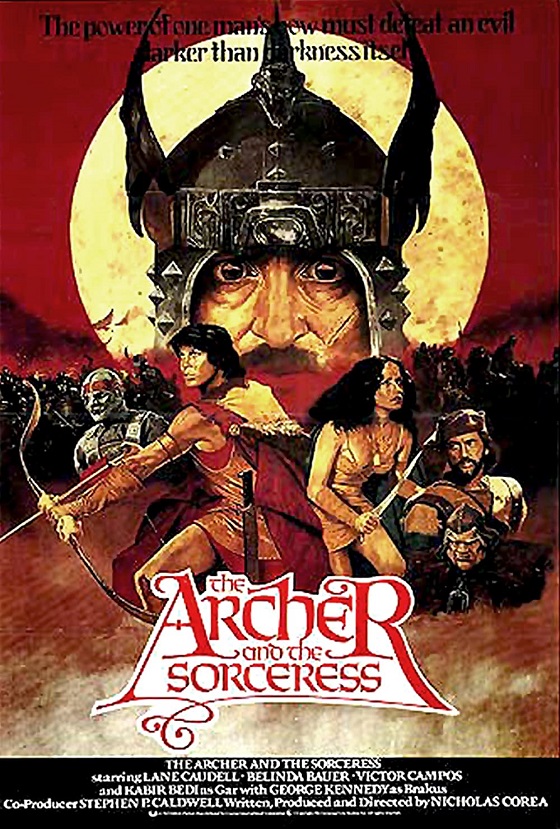
Cinema (Hero Press Two): A sword-and-sorcery flick that has long eluded me, I finally caved and got myself an imported German DVD of The Archer and The Sorceress aka The Archer: Fugitive from The Empire (aka Der Zauberbogen). The poster art, by Les Edwards, that had so stirred my youthful imagination, had always suggested that I was missing out out on another Deathstalker or The Warrior and The Sorceress, but sadly The Archer is a family-friendly, Certificate 12, failed TV pilot.
Science Fiction (Den of Geek): The phrase ‘warp drive’ didn’t originate in Star Trek, but in 1948 short story ‘The Flight of the Starling’. We delve into the tale that coined the term. Last week saw the launch of an enormous resource for science fiction fans, the Historical Dictionary of Science Fiction by lexicographer Jesse Sheidlower. The site includes 1,800 entries going back to the dawn of the 20th century, the dictionary contains not only definitions but also earliest known uses, biographical information about the writers, and over 1,600 scans of the original pages where these words first appeared.
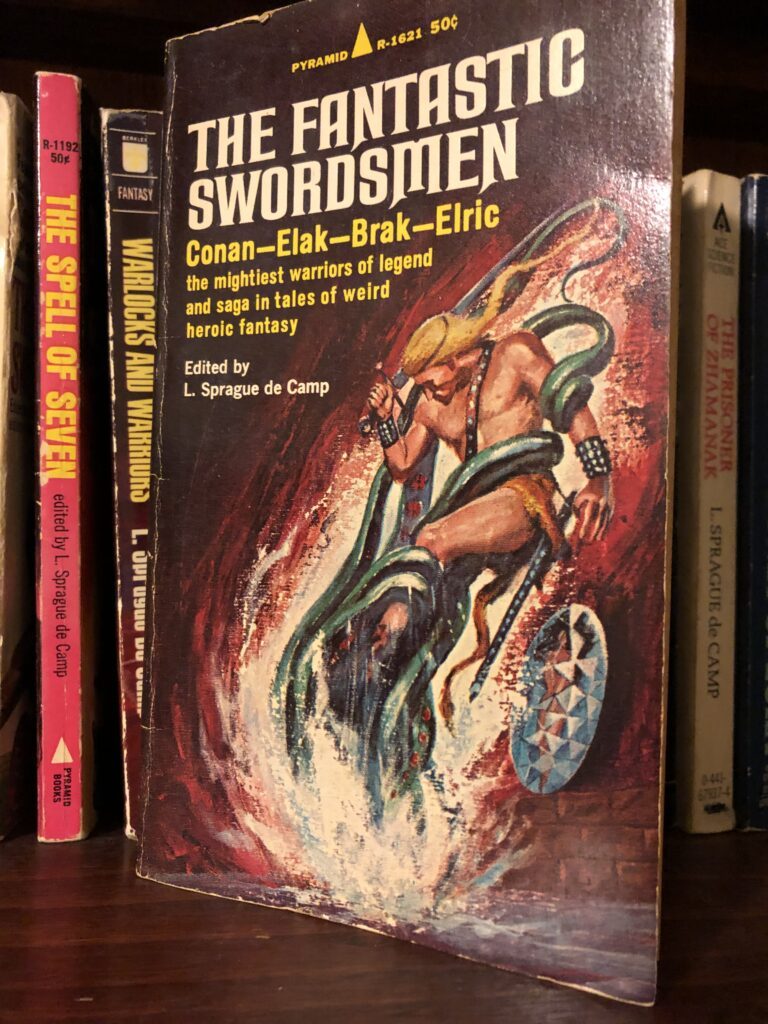
Fiction (Ken Lizzi): The Fantastic Swordsmen is the third entry in L. Sprague de Camp’s swords-and-sorcery anthology series. De Camp’s introduction is solid, but after a few of these apologias for S&S they all begin to read much the same. Don’t worry, the stories are better. Black Lotus. Robert Bloch. Bloch wrote this story at the age of sixteen. It is that sort of information that makes me want to snap my pen in two and toss my computer out the window. (The Defenestration of the ChromeBook. No, not catchy.) Read More
 There is a new magazine– Men’s Adventure Quarterly. This is a reprint publication celebrating the men’s adventure magazines that flourished from the 1950s to the 1970s. I have written before on some book reprints from New Texture. Bob Deis of New Texture has teamed up with Bill Cunningham to produce Men’s Adventure Quarterly.
There is a new magazine– Men’s Adventure Quarterly. This is a reprint publication celebrating the men’s adventure magazines that flourished from the 1950s to the 1970s. I have written before on some book reprints from New Texture. Bob Deis of New Texture has teamed up with Bill Cunningham to produce Men’s Adventure Quarterly.
This is THE most impressive magazine of its sort I have ever seen. Dimensions are 8.5 x 11 inches, perfect bound, 155 pages, most in color. The theme of this issue is “The Most Wanted Wild West Issue!” Read More
City of Goblins, Delvers LLC, and Limitless Seas
Saturday , 6, February 2021 Uncategorized 1 Comment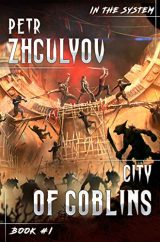 Along with 1,000 others from Earth, Ivan Susanin is transported to the System, to fight in a clash of alien pantheons that will determine the fate of each world. Those who refused the “honor” are dead, and those who die will be replaced. Those who fail to fight well will be stranded in the City of Goblins, forced to fend for themselves while the heroes return home to rest, rearm, and get dragged into the next skirmish. For once the System has ahold of you, the only way out is death.
Along with 1,000 others from Earth, Ivan Susanin is transported to the System, to fight in a clash of alien pantheons that will determine the fate of each world. Those who refused the “honor” are dead, and those who die will be replaced. Those who fail to fight well will be stranded in the City of Goblins, forced to fend for themselves while the heroes return home to rest, rearm, and get dragged into the next skirmish. For once the System has ahold of you, the only way out is death.
Petr Zhgulov’s City of Goblins combines the brutality of Goblin Slayer with the divine gladiatorial games of Small Unit Tactics. The brutality is matter-of-fact, not reveled in, as the System is an uncaring and unforgiving referee between the races doomed to fight on its battlegrounds. About half the people chosen cannot handle it, and are abandoned to death and fates even worse. But for those who can thrive, there’s opportunity to lead, even as the Earthly pantheon fights among itself. Ivan quickly rises to the top, but most of the endless waves of players are just cannon fodder that may help or harm his chances of a return trip home. City of Goblins is another in a long series of talented solo adventurers exploiting a restrictive ruleset in a futile and unending clash between unseen powers. But it also has an unflinching and almost jaded glimpse into humanity that Western LitRPGs, with their preference for eternal hope, avoid.
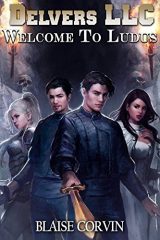 Henry and Jason were two regular guys and friends before getting dragged to another world at the whims of a capricious cosmic deity. Now they are stuck on Ludus, the playground of the god, where a mishmash of different kinds of humans live in a magically restricted low technology setting, and monsters roam the wilds. The pair of friends must now use their god-given powers to unite the planet, before the god grows tired of them and someone stronger claims the bounties on their heads.
Henry and Jason were two regular guys and friends before getting dragged to another world at the whims of a capricious cosmic deity. Now they are stuck on Ludus, the playground of the god, where a mishmash of different kinds of humans live in a magically restricted low technology setting, and monsters roam the wilds. The pair of friends must now use their god-given powers to unite the planet, before the god grows tired of them and someone stronger claims the bounties on their heads.
Blaise Corvin’s Delvers LLC: Welcome to Ludus starts as standard isekai portal fantasy, complete with new worlds, new powers, and, as the cover art hints at, the potential for harem hijinks. And while the general isekai form remains, that of heroes using their home’s knowledge to their advantage and creating an out-of-context problem for their new world, Delvers LLC puts a new spin on the genre. Friendship makes a difference, as the heroes are co-equal and partners, instead of rivals, as most male friends in isekai and light novels are treated as. Henry and Jason actually build a team around themselves instead of collecting pawns and admirers. While the standard power fantasy elements persist, they cling to the team as a whole, with Henry and Jason finding that their individual choices are more limited than those of contemporary isekai and litRPG heroes. While they might be in the drivers’ seats for their new inventions, they often are not in the tangled, growing web of relationships and alliances building around them.
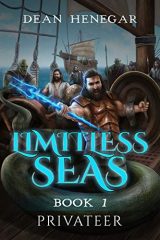 After a half-remember accident, retired Navy captain Craig Larson finds himself reborn into a strange new gameworld set on the fantasy high seas. He awakens chained to an oar in a pirate’s ship, but desires his own freedom. During a clash with a warship, Larson whips up the rowers into a rebellion and seizes the ship from the pirates. Now a captain once again, Larson sets out to make his path on the Limitless Seas. But why can’t he remember who he was, and only just the skills from his past life?
After a half-remember accident, retired Navy captain Craig Larson finds himself reborn into a strange new gameworld set on the fantasy high seas. He awakens chained to an oar in a pirate’s ship, but desires his own freedom. During a clash with a warship, Larson whips up the rowers into a rebellion and seizes the ship from the pirates. Now a captain once again, Larson sets out to make his path on the Limitless Seas. But why can’t he remember who he was, and only just the skills from his past life?
Dean Henegar’s Limitless Seas: Privateer shifts progression fantasy from the theme-park fantasy games of World of Warcraft to a just-as-idealized version of piracy. In many ways, Limitless Seas rolls back the conventions of litRPG to the 90s. Larson is immersed into his new world as totally as any portal fantasy hero experiencing his new surroundings. Gaming mechanics are moved behind a veil, so the action is immediate and realistic, without the rattle of dice or the activation of skills from menus. There is a hint of a real-word mystery, as the external events surrounding the fate of Larson’s physical body are revealed. But Limitless Seas: Privateer is built around the novelty of its setting, and that novelty isn’t enough to carry a standard progression fantasy story with stock characters, albeit a well-executed one, through to its final revelations.
Science Fiction and Fantasy New Releases: 06 February, 2021
Saturday , 6, February 2021 Uncategorized 1 CommentCutting edge electronic warfare, far-future transhuman empires, Roman legionnaires, and the Empress of Dreams adorn this week’s list of new releases.
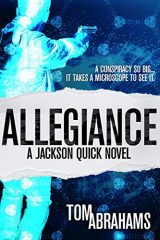 Allegiance (Jackson Quick #1) – Tom Abrahams
Allegiance (Jackson Quick #1) – Tom Abrahams
A conspiracy so big, it takes a microscope to see it.
Beer, redheads, and politics… Jackson Quick should have known better. First, he trusted a Texas politician. Then he fell for a leggy woman. Worst of all, he drank a beer that tasted funny.
Now, he’s running for his life and trying to save the world.
When Quick is kidnapped and interrogated about the encrypted tech he’s been charged by his powerful boss to deliver, he has no idea it’s connected to a missing research scientist on the verge of an earth-shaking breakthrough. Nor is he aware of its proximity to the attempted assassination of a political candidate.
In order to stop the unthinkable from becoming a reality, he’ll have to piece the mystery together.
 CyberWar (World War C #3) – Matthew Mather
CyberWar (World War C #3) – Matthew Mather
International borders slammed shut. Communications wrecked.
GPS signals non-existent. Worldwide power blackouts.
The planet balances on the edge of chaos.
Chechen separatists destroyed thousands of satellites in orbit, the effects crippling the world’s militaries. Power and communications failures sweep the planet, while emergency services are hobbled as fires and powerful storms rip across America.
Still recovering from his injuries, Mike Mitchell returns to his family at Senator Seymour’s residence in Virginia, the place a fortress secured by dozens of Secret Service agents. The CIA has tracked down the terrorists that launched the attacks and offers a front-row seat to watch events unfold as a SEAL team closes in–but the video feed goes dead.
Outside the senator’s house, thudding detonations as an attack begins.
Scrambling to stay alive, Mike realizes the onslaught isn’t only against the Seymour residence in Virginia, but that a furious blitz has begun all over the country. As the full weight of America’s military presses on stopping these terrorists, how are the attacks possible? Is it an invasion? Or something more sinister?
With their lives and the fate of the nation hanging in the balance, the bigger question becomes–who is the real enemy?
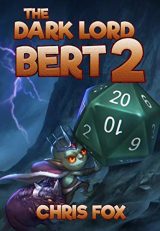 The Dark Lord Bert 2 – Chris Fox
The Dark Lord Bert 2 – Chris Fox
How Does a 1 Hit Point Dark Lord Save the Real World?
Kit and her friends are gamers, but not the ordinary kind. It seems that Track Jick was right, and that people who play roleplaying games really are wizards and witches. Kit’s game master uses a magical die to transport them to an alternate world where they can really become their characters, and forget all about the real world.
Unfortunately, during a power scuffle the d20 gets knocked into the game world. If they can’t get it out then the game world will explode, and everything in it will die. Worse, to Kit’s mind, their parents will be disbarred, and they’ll never be able to play again.
Enter one tiny goblin with just a single hit point, but a heart large enough to save a fake world…if he can reach the d20 before the Dark Lord White 2.0. Along the way Bert will meet his fellow dark lords, and finally learn magic. Plus Boberton gets very large indeed.
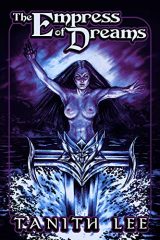 The Empress of Dreams – Tanith Lee
The Empress of Dreams – Tanith Lee
“Tanith Lee: Princess Royal of Heroic Fantasy” –Village Voice
“Tanith Lee truly has become the Scheherazade of our time.” –Arkham House
“From the day that her novel The Birthgrave was first published Tanith Lee has been a blazing gem in the crown of fantasy literature… ‘Princess Royal’… perhaps better the Empress of Dreams.” –Donald A. Wollheim
Throughout her forty-year career, Tanith Lee proved herself adept at numerous genres, including high fantasy, horror, science fiction, and combinations thereof. One of her specialties was the variety of heroic fantasy known as sword-and-sorcery. Novels such as The Birthgrave, Night’s Master, and The Storm Lord are highly regarded by both fans and critics, but she has a wealth of short stories to her credit as well. Sixteen of Tanith’s tales of swords and sorcery appear in this collection. When you read them, you will discover why she deserves such exalted titles as “Princess Royal of Heroic Fantasy” and The Empress of Dreams. Read More
The first three volumes of the 2020 edition of the Junior Classics are now available at Castalia Direct as well as on Amazon. The digital editions will be made available after they are sent to the backers. They are an ideal resource for homeschoolers.
- Vol. I Fairy Tales & Fables
- Vol. II Myths & Legends
- Vol. III Tales of Greece & Rome
The purpose of The Junior Classics is to provide, in ten volumes containing about five thousand pages, a classified collection of tales, stories, and poems, both ancient and modern, suitable for boys and girls of from six to sixteen years of age. The boy or girl who becomes familiar with the charming tales and poems in this collection will have gained a knowledge of literature and history that will be of high value in other school and home work. Here are the real elements of imaginative narration, poetry, and ethics, which should enter into the education of every child.
Robert E. Howard (Adventures Fantastic): The opening is one of Howard’s best. A Roman governor, Titus Sulla, is showing a Pictish ambassador Roman justice by executing a Pict by crucifixion. The ambassador watches stoically without saying anything. The ambassador is of course the Pictish king Bran Mak Morn in disguise.The dying man provokes one of the guards into killing him, which angers the Sulla. It was the quickest death the Pict could experience, and the governor wanted him to suffer. The guard is sentenced to jail.

Cinema (Arkhaven Comics): In a pre-Star Wars universe, guys in silly rubber costumes tramping around flimsy sets were awesome. Give a kid a bunch of cardboard boxes and a crayon and within minutes there were would be a Tokyo skyline. All ready to be stomped flat by a boy who was hunched over and occasionally interrupting the carnage to give his mighty Godzilla roar. When I was nine, my only sources of income were scouring parking lots for dropped change, returning pop bottles, and (for one summer) cutting the teeth out of sharks that had drowned in the nets for the creepy guy who made necklaces out of them.

Publishing (DMR Books): Carcosa, the imprint founded by Karl Edward Wagner with partners David Drake and Jim Groce, came to be partially out of the concern that Arkham House would close shop after the death of August Derleth in 1971. Thankfully, that didn’t happen. But for me, the four Carcosa volumes are Arkham House books by extension. They are design-executed as traditional AH titles and are absolutely essential books in the macabre-fantasy genres. Read More
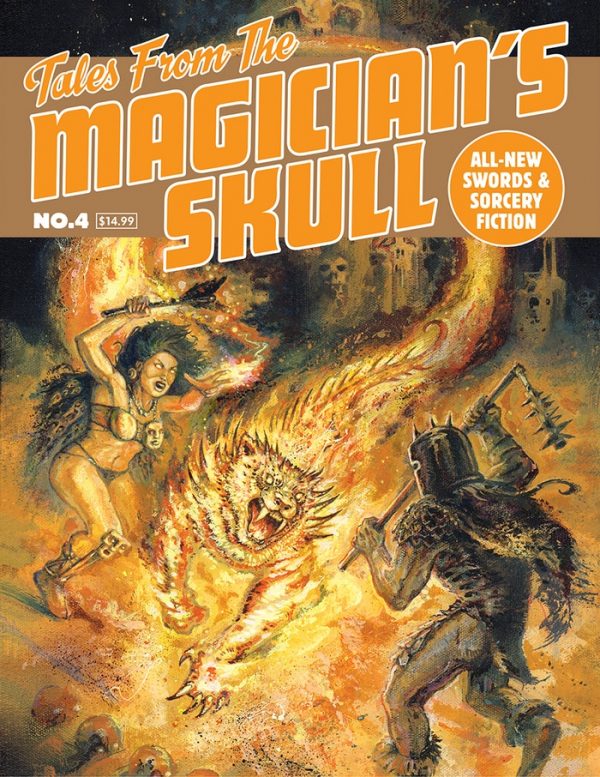 I have been slowly making my way through the issues of Tales of the Magician’s Skull. Most recently, issue number four. 8.5 x 11 inches in dimensions, 72 pages, $14.99, published in 2020. Cover by Doug Kovacs for this issue.
I have been slowly making my way through the issues of Tales of the Magician’s Skull. Most recently, issue number four. 8.5 x 11 inches in dimensions, 72 pages, $14.99, published in 2020. Cover by Doug Kovacs for this issue.
John C. Hocking’s Benhus returns in “Guardian of the Broken Gem.” Benhus is on a mission to retrieve a gem in secret market of forbidden things.
Adrian Cole has written as many or possibly more Elak of Atlantis stories than Henry Kuttner. “On Death Seed Island” has Elak’s ship looking for a source of water. They land on an island with plants controlled by a supernatural entity. Read More
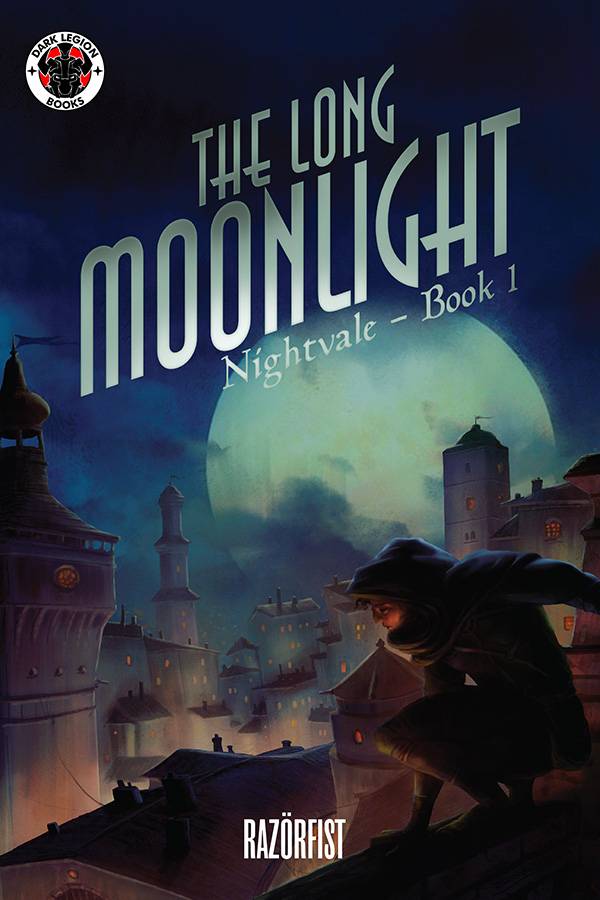
“The thing that rose to its feet was no longer Xerdes, Menuvian outlaw.
“It was no longer a man at all.
“What emerged was an instrument of inviolate vengeance.” – Razorfist, The Long Moonlight
During a second-floor job in Menuvia’s richer districts, professional thief Xerdes overhears the name of a man he once watched die. He soon finds himself drafted into an underworld power struggle threating to burn down the city of Menuvia. But when the web of double-crosses cuts too close to home, Xerdes might be the one to light the match.
Thief: the Dark Project meets The Shadow in YouTube and Unauthorized.tv commentator Razorfist’s first pulp fantasy noir. The result, The Long Moonlight, reads as a best parts digest of the adventures of fantasy thieves such as Locke Lamora, but, at a slim 115 pages, without the expositional padding those require to reach epic fantasy doorstopper length.
As a proper thief, Xerdes is not above violence when needed, he holds to the idea that a professional should avoid the messiness. Unfortunately, messiness comes to Xerdes’s door in the guise of Saryss, a skilled mercenary swordswoman from the north who becomes Xerdes’s partner in crime–and in bed. Their romance is slow, deliberate, and comfortable, until it ends abruptly with Saryss’s death. At that point, Xerdes becomes something more than the lone survivor of a exceptionally talented thieving crew. An instrument of inviolate vengeance he might become, but Xerdes is more James Bond than the Shadow that continuously swirls about him. He can still be rash, make mistakes, yet press home his plans and his blade with fury and precision. And yet Xerdes joins the recent resurgence of the indirect approach, taking his vengeance in part from setting his targets’ greed and desires against themselves. After all, the poison rotting inside a crime lord does not have to be physical, and a thrashing overreation can be as deadly as a dagger. Will Xerdes’s vengeance taste of honey or of ash?
Among his many projects, Razorfist is the host of The Shadowcast, a podcast devoted to Walter Gibson’s best known crime fighter. And the foggy, shadowing atmosphere of Gibson lingers over each page. But Razorfist is not copying the prolific pulp master’s style. He fills each page with the rapid-fire wordplay that fills each of his videos, just without the sardonic bite and endless stream of cultural references. Rhythm, rhyme, alliteration; all are used to craft a distinct voice in narration. Sometimes, there is a misstep in the attempt, but the departure from the thin gruel of contemporary transparent prose is much appreciated. And, in the tradition of the pulps, bring a dictionary. The eloquent prose occasionally unearths words so rare that they might be pearls. Unlike the thieves’ tales of The Lies of Locke Lamora, The Long Moonlight is written with an ear for the spoken word, and needs to be listened to in order to catch the full effect of the wordplay. Fortunately, an audiobook is in the works.
But don’t sleep on the paperback. From the first splash page to the consistent illustrations throughout, The Long Moonlight plays to the strengths of the printed word. The crosshatched shadows are drawn around the text in a way that lets illustration and prose heighten each other in a layout that an ebook cannot readily mimic. Razorfist also relies on Terry Pratchett-style footnotes to tuck away little bit of exposition and worldbuilding. This allows him to keep the story lean and free from digression, as explanations for the various styles and countries are an optional flick of the eyes to the bottom of the pages. And again, the printed word minimizes this interruption in a way that the loading of ebooks hyperlinks cannot. The Long Moonlight is a master’s piece of print design that makes it’s paper versions the definitive version to read.
The Long Moonlight is a strong freshman effort, marrying visual design to elocution to create a bloody tale of vengeance among the shadows. And readers can expect more from Xerdes and Razorfist with two sequels, The Ghost Wind and The Faceless Phantom in the works
Science Fiction and Fantasy New Releases: 30 January, 2021
Saturday , 30, January 2021 Uncategorized 3 CommentsRaygun Romans, mecha mercenaries, and prolific pulpsters loom large in this week’s newest releases.
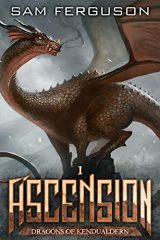 Ascension – Sam Ferguson
Ascension – Sam Ferguson
Gorliad is the first crowned prince to hatch in centuries. But can he rule?
Destined to one day conquer a kingdom of his own, he begins his rigorous training and progresses wonderfully. That is, until a rival dragon descends upon the kingdom in a ferocious battle that leaves Gorliad crippled, and bereft of his birthright.
The young dragon will need to find the fires deep within his soul if he is to overcome his handicap, but even victory may bring defeat as he will have to risk his father’s kingdom and everything in it to ascend to his promised throne.
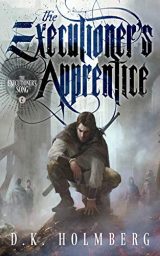 The Executioner’s Apprentice (The Executioner’s Song #2) – D. K. Holmberg
The Executioner’s Apprentice (The Executioner’s Song #2) – D. K. Holmberg
Executioners search for justice, not vengeance. Finn questions why it can’t be both.
As apprentice to the master executioner, Finn struggles to understand his place in the city as he searches for truth in those sentenced. The job is more complicated than he ever imagined. He’s proven his understanding of the basics, but for him to serve as an executioner—if that’s what he wants—he needs mastery.
Distracted by his search for a way to heal his still ailing mother despite the hegen magic, he finds himself at odds with the master executioner.
When assigned his first solo case, he knows he needs to impress Meyer. An investigation into a fire that burned through an entire section of the city leads Finn to learn of a greater threat to Verendal—and the entire kingdom.
When only Finn believes there’s more to the fire, can he save the city or will his quest for vengeance finally lead to his downfall?
 The Golden Viper (The Crimson Deathbringer #2) – Sean Robins
The Golden Viper (The Crimson Deathbringer #2) – Sean Robins
Will the galaxy survive?
Kanoor has fallen.
The Xortaags are back with a vengeance. Not being the forgive-and-forget types, they’ve conquered the Akakie homeworld, and now they set their sight upon Earth. Having reverse-engineered the advanced technology they scavenged on Kanoor, they now hold the key to rule the universe forever. It now befalls to Jim and his friends to save not only humanity, but every sentient species in the galaxy.
To make matters worse, an even more sinister threat is looming in the darkness. Unknown to our heroes, a time-travelling alien fleet is on its way to our neck of the galactic woods.
You thought the stakes were high during the first human-Akakie-Xortaag intergalactic war? You ain’t seen nothing yet!
 Pulp on Pulp: Tips and Tricks for Writing Pulp Fiction – edited by Kit Sun Cheah and Misha Burnett
Pulp on Pulp: Tips and Tricks for Writing Pulp Fiction – edited by Kit Sun Cheah and Misha Burnett
Write Fast. Write Well. Get Paid.
These were the watchwords of old-school pulp fiction: fun, fast-paced, and immensely popular with readers.
The pulp era is coming back.
Blending timeless lessons from the grandmasters of the pulp era with the genres, tastes and technologies of today, PulpRev forges boldly ahead into the future of fiction.
Hugo and Dragon Award nominated writer Kit Sun Cheah teams up with Misha Burnett to compile a selection of essays on the PulpRev aesthetic from some of the leading writers in the movement.
Pulp on Pulp covers:
* How to plot like a pulp grandmaster
* How to write 5000 words a day
* The secrets of writing fantastic fight scenes
* Worldbuilding and character creation tips
* And many more!
PulpRev is the Revolution, Revival and the Renaissance of Pulp. Take the plunge into the new pulp era and become the best writer you can be! Read More
Sensor Sweep: A. Merritt, Robert E. Howard, Robert McGinnis
Monday , 25, January 2021 Sensor Sweep 3 Comments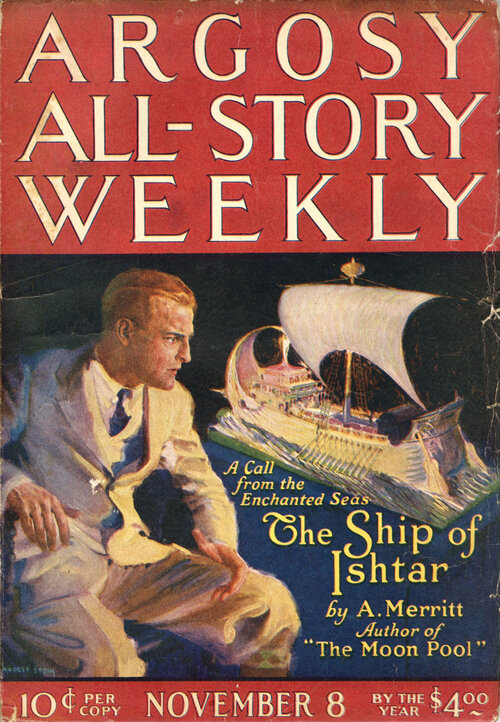
Fiction (DMR Books): For today’s birthday tribute to Merritt, I thought that I’d focus on that classic novel, which was originally serialized in Argosy All-Story Weekly between November 8, 1924 and December 13, 1924, prior to being published in hardcover by G. P. Putnam’s Sons in 1926. Following that, it was reprinted many times, including in magazine form in Fantastic Novels (March 1948) and numerous paperback reprints from Avon.
Cinema (Arkhaven Comics): Disney (freaking) Entertainment has LOST the kid’s market. By every conceivable metric (except SJW critical approval), they have lost the audience that built the company. The reason they’ve lost that market is that Bob Iger threw away his Irreplaceable Man. Let me start by stating, that I come to bury John Lasseter not to praise him. While he presided over what was nearly a second Disney Renaissance, his time at the company ultimately resulted in leading the animation studios into a pattern of decaying artistic failure.
Publishing (Amatopia): There’s a school of thought that self-publishing is embarrassing and opened the floodgates to a whole bunch of shoddy work that would never have seen the light of day if the gatekeepers were properly gatekeeping everything, and the unwashed and unschooled masses did not have access to this democritizing technology. And that’s all true. Most of it. I differ at the typical smug go-to insult, which is the “embarrassing” part. Read More
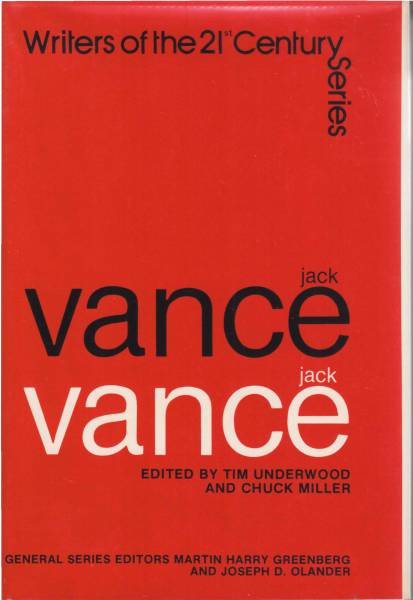 I enjoy non-fiction about fiction. A good essay about an author will get me to check them out. One that made me want to read the author was Jack Vance. It is a collection of essays from Taplinger’s Writers of the 21st Century.
I enjoy non-fiction about fiction. A good essay about an author will get me to check them out. One that made me want to read the author was Jack Vance. It is a collection of essays from Taplinger’s Writers of the 21st Century.
There were seven books in the series from 1977 to 1983: Arthur C. Clarke, Isaac Asimov, Robert A. Heinlein, Ray Bradbury, Ursula K. LeGuin, Jack Vance, and Philip K. Dick.
My top three science fiction writers are Poul Anderson, H. Beam Piper, and Jack Vance. In the case of Vance, that was not always so. I had attempted to read I either “The Dragon Masters” or “The Last Castle” in The Hugo Winners: Volumes 1 and 2. I was just not ready for Vance at that age. A little later, I got the Timescape edition of The Dying Earth. I was heavily into Clark Ashton Smith. The Dying Earth did little for me (I know). Read More
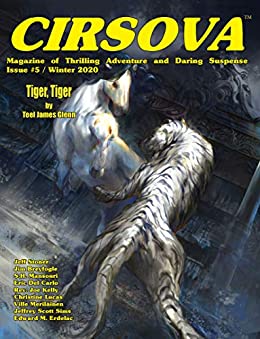 Help Cirsova Magazine celebrate five years of thrilling adventure and daring suspense. The Anniversary issue will also feature a serialized Wild Stars novel, more Mongoose and Meerkat, more Rogues of Merth, a reprint of 1980s indie comic Badaxe, interior illustrations, and even an appearance from Touhou Project’s memetic magical cat Chen. Check out the Kickstarter for more details.
Help Cirsova Magazine celebrate five years of thrilling adventure and daring suspense. The Anniversary issue will also feature a serialized Wild Stars novel, more Mongoose and Meerkat, more Rogues of Merth, a reprint of 1980s indie comic Badaxe, interior illustrations, and even an appearance from Touhou Project’s memetic magical cat Chen. Check out the Kickstarter for more details.
Cirsova Magazine closes out 2020 in high fashion, with seven out of the ten tales from the Winter 2020 issue selected for Tangent Online’s 2020 Recommended Reading List. And, for once in the yearly round-up season, the stories match the hype. The Winter issue focuses heavily on fantasies with Germanic, Scandinavian, and Egyptian settings, although a few original settings such as Mongoose and Meerkat appear.
“Tiger, Tiger” leads off the magazine with a sensual and seedy pre-WWII spy thriller reminiscent of John Thunstone and other Weird Tales occult detectives. The finale gave inspiration to the gorgeous cover illustration.
“Making Good” discovers the unsavory prices one must pay to control things from beyond our understanding. And some are too steep. Another German occultic tale, post WWII this time.
“Pulsa” dives straight into paternal horror, with the sins of the SS soldier father being visited on the son. The gimmick behind the Pulsa is horrifying, but becomes predictable once the mysterious curse gets figured out. And the Nazi Germany antagonist, as an idea, wore thin in a time where only Nazis can be bad guys. But the emotional shock of a father’s growing dread is worth the read. Read More